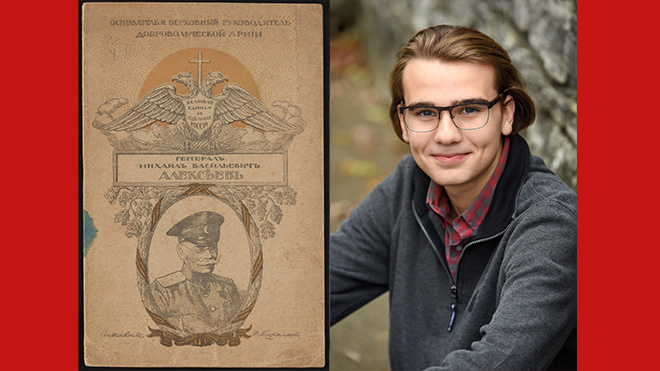“There is something about holding history in your hands”: Senior History major explores the Russian Revolutionary War while digitizing war paraphernalia
History major Nick Campbell conducted research on the failure of the anti-Bolshevik forces in 1917 to consolidate against revolutionary leader Vladimir Lenin.

“There is something about holding history in your hands”: Senior History major explores the Russian Revolutionary War while digitizing war paraphernalia
When Nick Campbell first approached Stephen Norris, director of the Havighurst Center for Russian and Post-Soviet Studies, about mentoring him through the Undergraduate Summer Scholars (USS) program and his project on the Russian Revolutionary War, Campbell was envisioning reading and analyzing different materials, and not a lot more.
“We came up with a small research plan. I was going to read these books and these primary sources, and that was it, that was the original plan,” said Campbell. “However, then I was accepted, and Dr. Norris said he wanted me to do a little bit of what he does.”
So, Campbell found himself helping Norris’s team in the Special Collections department of King Library, going through and digitizing century-old Russian pamphlets. His elementary Russian skills helped him with his research and cataloging duties, with the main goal of analyzing the 1917 Bolshevik Revolution.
During this conflict, the leftist revolutionary Vladimir Lenin led the Bolsheviks to seize power in October 1917 just over seven months after Tsar Nicholas II had abdicated, ending over 300 years of Romanov rule. The Bolsheviks would later become the Communist Party of the Soviet Union. The anti-Bolsheviks, made up of liberals, monarchists, and other socialists, fought the dictatorship established by Lenin.
“My research focused on the failure of the anti-Bolshevik forces to consolidate,” said Campbell. “I wanted to understand the war, why they had failed, how the Bolsheviks formed a dominant ideology, and how that won the war.”
Campbell also wanted to work towards preserving related materials, such as old funeral banners and military pamphlets. He appreciated the logistical benefits of his work in the digitization process, which allows others to appreciate these materials without needing to go to the library.
“As a huge history nerd, there is something about holding history in your hands that is just really moving to me,” he said.
Aside from Norris, Campbell also received great guidance from Special Collections staff members Masha Stepanova and Alia Wegner. Stepanova is the coordinator of cataloging and the Slavic librarian, while Wegner is the digital collections librarian. They both guided him through the entirety of the research process, including the specifics of digitization and use of the library equipment, such as a sophisticated document scanner designed specifically for fragile documents.
Through this project, Campbell said that he learned the importance of people in history, versus a singular great leader. “History tends to portray itself as being led by great men, but instead history is led by the people,” he said.
Besides History, Campbell is also pursuing a major in Political Science. He added that this project has inspired him to earn a doctorate in Eurasian studies, which he would then like to use for teaching.
“The best thing about this undergrad program is having a mentor,” Campbell said. “When you go to grad school, you might have a professor, but he will have hundreds of students. This really helps you narrow down how to academically research, and you only get some of that in the classroom.”